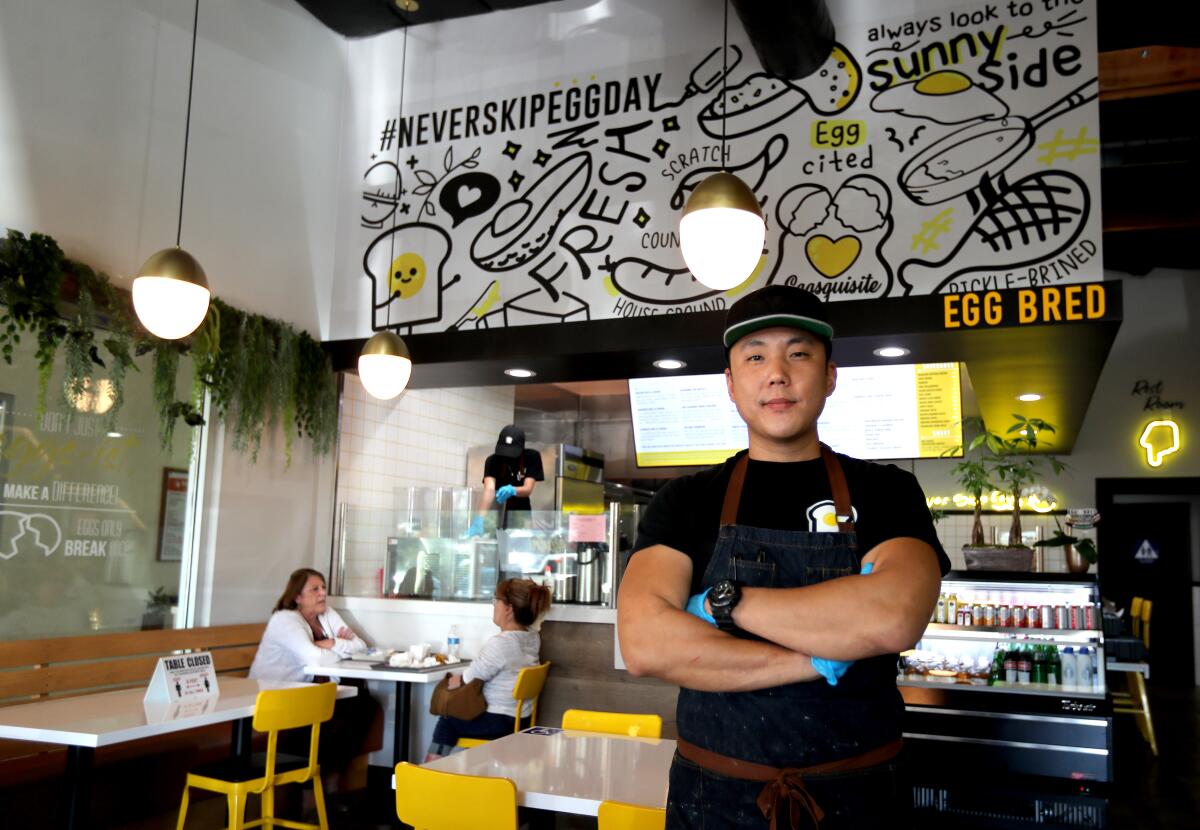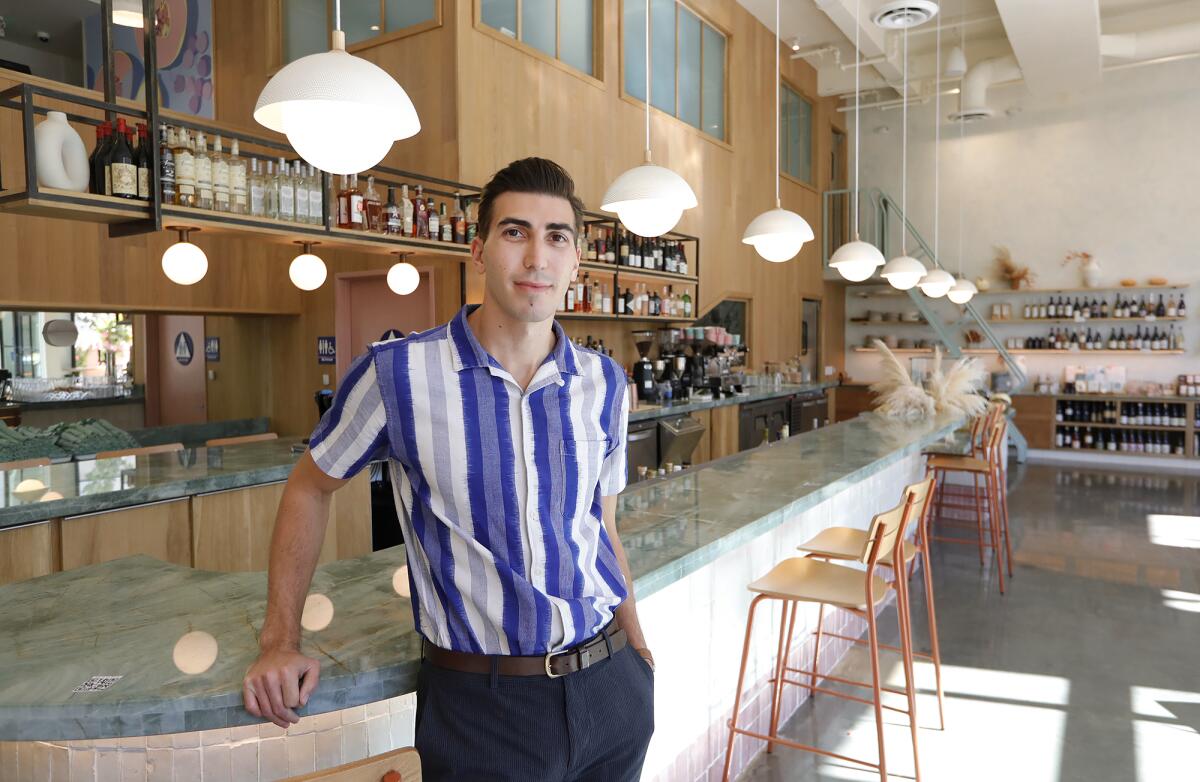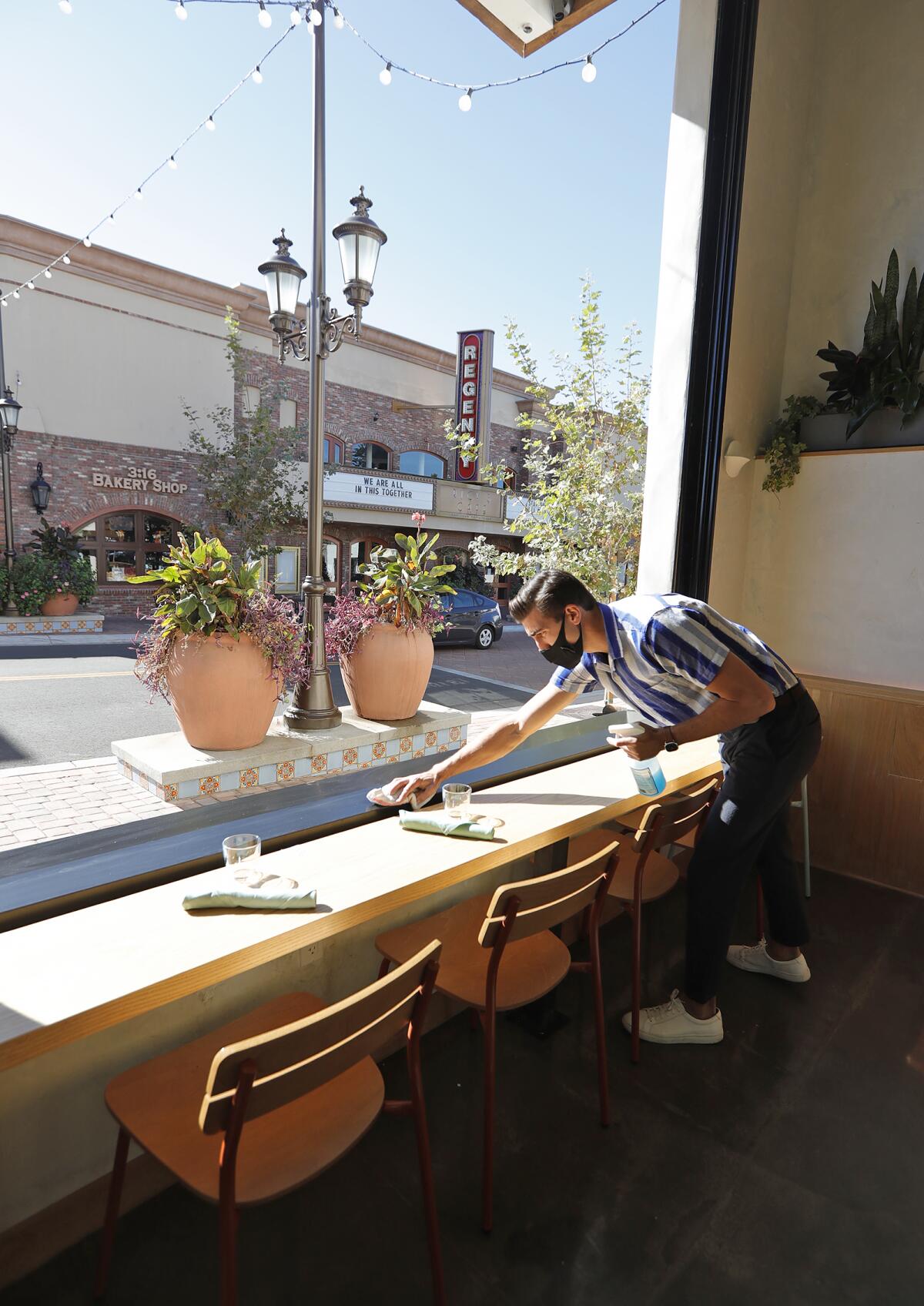âLetâs just keep moving forwardâ: These O.C. eateries boldly opened during a pandemic

Sixty-one degrees? Rain? Whatever.
The elements didnât stop a queue of socially distanced customers from trailing out of Eggbredâs door and around the parking lot on a chilly Saturday morning. The reward for their wait: inventive breakfast sandwiches crafted by owner Albert Shim, who opened the La Habra restaurant on Oct. 10.
â[The decision to open] was kind of in full faith,â Shim said. âI was just like, âScrew it, I canât hold off any longer. I just gotta do it.â
Shim, 35, is one of the few bold souls who started a business in the food and beverage sector in 2020 â the industryâs most devastating year in recent memory.
According to a survey conducted by the National Restaurant Assn., the food service industry is projected to lose $240 billion by the end of the year. Within California, an estimated one in three restaurants will be casualties of the coronavirus pandemic, closing permanently or shuttering multiple locations.
Edwin Goei gives some recommendations on eating in the time of coronavirus when you live in Orange County.
Starting a new restaurant is challenging under normal circumstances, especially with Orange Countyâs steep rent and depth of competition. But the addition of a pandemic has narrowed the odds of success even further.

Shim originally planned to open Eggbred in April but postponed when lockdown restrictions went into effect.
âI was so scared about the pandemic and stuff, [but] I feel like we bypassed the majority of that, and I just feel super blessed and fortunate.â
And though he said heâs exhausted and âborderline deliriousâ from working 40 days in a row, Shimâs not complaining.
âIâm super grateful for everything,â he said. âI just want to make sure weâre structured and can serve the customers well. Itâs so hard to do right now.â
If the lines outside of Eggbred are any indication, his faith has paid off.

Thirty-seven miles southeast in downtown San Juan Capistrano, George Barker, the 29-year-old owner of Mayfield, prepared for the dinner shift with his staff. Reservations for the restaurantâs modern Mediterranean fare have sold out multiple weekends since it launched full service dining at the end of August.
Tonightâs challenge is the rain, hindering seating on the outdoor patio.
Barker chuckled.
âItâs cold outside, and basically sitting inside will feel like you sat outside,â he said.

Named after Barkerâs hometown in the U.K., Mayfield is his dream four years in the making. After moving from London to Orange County in 2017, Barker opened a food truck, vetted potential restaurant locations and secured Mayfieldâs current space on Camino Capistrano.
Construction began the week before lockdown in March. Barker couldnât go to the site for seven weeks and had to communicate with the construction crew and his chef through video calls.
âAt the very start, it was hard,â he said. âWe were trying to plan, like, building a kitchen, stocking the kitchen, hiring, writing menus. And we didnât even get the recipe tests for like 12 weeks because we couldnât see each other. So that was challenging.â
Though opening in the midst of a pandemic wasnât an ideal scenario, Barker is grateful that he could open Mayfield later in the year.
âWeâve worked with it,â he said, âAnd I think part of being a restaurant is every night, you have to deal with situations and figure things out and work things out. And [the pandemic] is just another one of those.â
The next day in downtown Santa Ana, Brit Costello, 35, and Jason âJ-Birdâ Venable, 36, sat in the taproom of Cerveza Cito Brewery and reflected on the chaotic five weeks since the breweryâs Oct. 1 opening.
On separate weekends, there were the Santiago and Blue Ridge fires (resulting in poor air quality), Halloween, the presidential election and now a spike in COVID-19 cases.
Fable & Spirit is a sophisticated neighborhood pub, both classy and comfy, in Lido Marinaâs growing culinary scene.
Costello, the tasting room manager, smiled wryly.
âIt feels like weâve been open longer than we have,â she said. âIt really does.â
Venable laughed. The owner of the brewery and one of the three co-founders of the Santa Ana hair products company Suavecito Pomade, Venable was in the middle of purchasing the brewery space when lockdown went into effect.
âItâs just one of the things where [we said] âLetâs just keep going forward,â and I donât think we had any idea it was going to get this crazy,â he said. âI think weâve actually been luckier than most, that people are totally willing and havenât really caused many issues when it comes to, like, abiding by the rules.â
Of all the businesses in the food and beverage sector, craft breweries have had some of the largest losses in sales and the most confusing restrictions. Under the current tier system, customers cannot buy beers at a brewery without also buying an accompanying meal.
For breweries without dedicated kitchens like Cerveza Cito, that means playing musical chairs with food trucks and forming partnerships to guarantee thereâs a different one onsite every day. The food also needs to pair well with the breweryâs Latin-inspired beers, whose ingredients â prickly pear fruit, Ibarra Mexican chocolate and ghost pepper spice, among others â reflect the cityâs and Venableâs heritage.
While the brewery has had consistent sales, Venable and Costello stressed the importance of being flexible and having an action plan to survive.
âYou have to be totally willing to throw anything out the door if something changes at the drop of a hat, because it does,â Costello said. âI think we all learned that this year: how fast things can change.â
That afternoon in Garden Grove, Phoebe Pham carried a folding table and chairs outside and arranged them in front of the dessert shop she co-owns, Mmm Gelato and More.
Though the customers stayed inside the shop â itâs 64 degrees and windy â Pham was comfortable sitting outside.
âThis actually feels good,â she said. âI went to school at Boston University.â
Phamâs business has endured every closure and restriction since the beginning of the pandemic. She and her business partners tried to open Mmm Gelato in March but closed when lockdown began.
Featuring mainly gelato, coffee and matcha drinks with a Southeast Asian twist, the business couldnât sell many of its offerings through delivery services due to their risk of melting.
Mmm Gelato reopened for takeout after lockdown ended and slowly expanded its hours to a regular schedule by August.
âWe have to push back our grand opening day,â Pham said. âIn fact, we havenât had a grand-opening day yet. So itâs like we have the longest soft opening ever.â
In addition to the rigor of helping run her first business, Pham is expecting her second child, due at the end of the year. She credited having a growth mindset with getting her and the shopâs staff through the difficult days.
â[The pandemic] slowed down our plan. But on a positive side, we have more time,â she said. âWhen we first opened, we made mistakes. But we learned through it. Me and the other partners, we think of this as something to try, just to have fun. So thatâs why we opened the store; we try to bring that positivity to other people.
âA lot of things happened this year. But at the end, we still have to be positive to get through everything together.â
All the latest on Orange County from Orange County.
Get our free TimesOC newsletter.
You may occasionally receive promotional content from the Daily Pilot.



